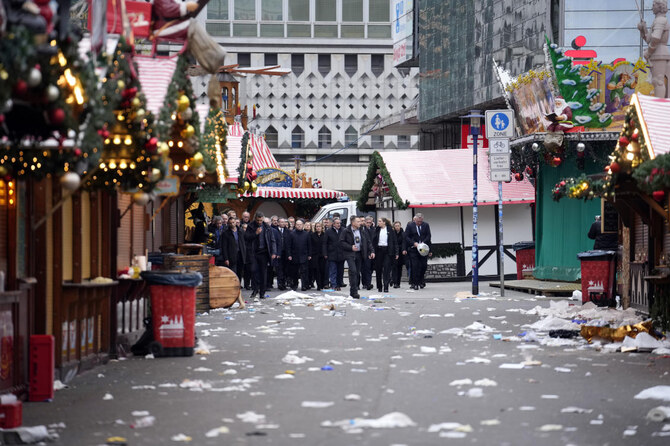MAGDEBURG, Germany: At least five people were killed in a car-ramming attack at a German Christmas market in the city of Magdeburg that also left more than 200 injured, officials said, and a Saudi man was arrested on suspicion of driving a car into the crowd.
The Friday evening attack on market visitors gathered to celebrate the pre-Christmas season comes amid a fierce debate over security and migration during an election campaign in Germany, where the far right is polling strongly.
“What a terrible act it is to injure and kill so many people there with such brutality,” Chancellor Olaf Scholz said in the central city, part of the former East Germany, where he laid a white rose at a church in honor of the victims.
“We have now learnt that over 200 people have been injured,” he added. “Almost 40 are so seriously injured that we must be very worried about them.”
German authorities are investigating a 50-year-old Saudi doctor who has lived in Germany for almost two decades in connection with the car-ramming. Police searched his home overnight.
The motive remained unclear and police have not yet named the suspect. He has been named in German media as Taleb A.
Officials said on Saturday he held strongly anti-Islam views and was angry with Germany’s migrant and asylum policy.
A Saudi source told Reuters that Saudi Arabia had warned German authorities about the attacker after he posted extremist views on his personal X account that threatened peace and security.
Der Spiegel reported that the suspect had sympathized with the far-right Alternative for Germany (AfD) party. The magazine did not say where it got the information.
Germany’s domestic intelligence agency declined to comment on the ongoing investigation.
Germany’s FAZ newspaper said it interviewed the suspect in 2019, describing him as an anti-Islam activist.
“People like me, who have an Islamic background but are no longer believers, are met with neither understanding nor tolerance by Muslims here,” he was quoted as saying. “I am history’s most aggressive critic of Islam. If you don’t believe me, ask the Arabs.”
Andrea Reis, who had been at the market on Friday, returned on Saturday with her daughter Julia to lay a candle by the church overlooking the site. She said that had it not been for a matter of moments, they may have been in the car’s path.
“I said, ‘let’s go and get a sausage’, but my daughter said ‘no let’s keep walking around’. If we’d stayed where we were we’d have been in the car’s path,” she said.
Tears ran down her face as she described the scene. “Children screaming, crying for mama. You can’t forget that,” she said.
Scholz’s Social Democrats are trailing both the far-right AfD and the frontrunner conservative opposition in opinion polls ahead of snap elections set for Feb. 23.
The AfD, which enjoys particularly strong support in the former East, has led calls for a crackdown on migration to the country.
Its chancellor candidate Alice Weidel and co-leader Tino Chrupalla issued a statement on Saturday condemning the attack.
“The terrible attack on the Christmas market in Magdeburg in the middle of the peaceful pre-Christmas period has shaken us,” they said.
A leading Social Democrat lawmaker in the Bundestag parliament warned against jumping to conclusions and said it appeared the attacker did not have an Islamist motive.
“Now we have to wait for the investigations. It seems that things are different here than was initially assumed,” Dirk Wiese told the Rheinische Post newspaper.
























